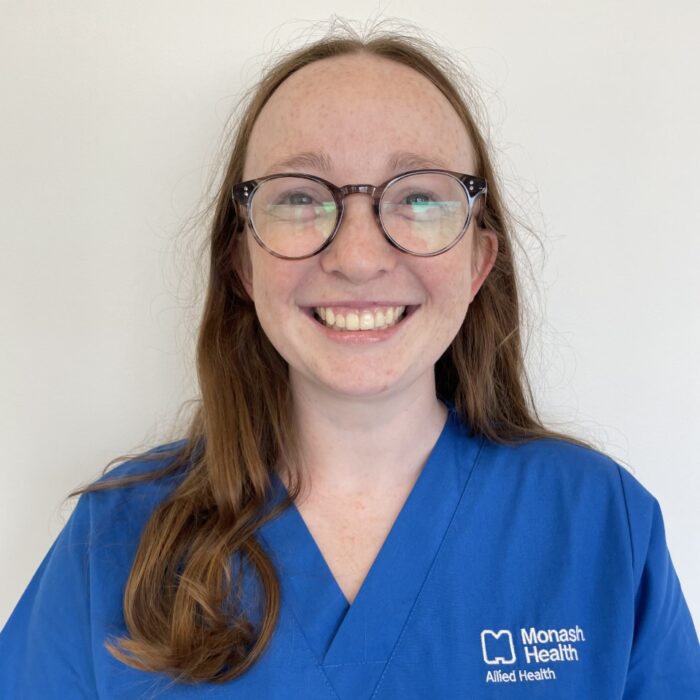Home > Research > Resources for Researchers > Get involved in Research at Monash Health > Emerging Researcher Fellowships
Emerging Researcher Fellowships
The Chief Executive has established the Monash Health Emerging Researcher Fellowship. The primary purpose of the Fellowship is to invest in early research career individuals, with significant potential for a research career and for whom a fellowship would contribute to that end.
The Fellowship is to encourage Monash Health employees to conduct a translational research project and to target emerging researchers. The Fellowships have a focus on supporting talented individuals in commencing research and to act as a preparatory step for an individual to be accepted towards a PhD.
Applications for 2024 close on the 10th of April 2024.
Document Downloads
Emerging Researcher 2024 Application Form
Word document
Emerging Researcher 2024 Guidelines
PDF document
2023 Emerging Researcher Fellowship recipients

Shay Payne
Medical Physicist Trainee
Study Title: Develop an AI-based algorithm for converting 3D tomosynthesis images into simulated 2D mammography images
Breast cancer is the most common cancer in women and early detection is crucial for effective treatment. Digital mammography is widely used for screening, but it has limitations. Tomosynthesis provides 3D images of the breast but requires a higher radiation dose, particularly if further mammography images are taken essentially doubling the dose for a breast screen. This project aims to develop an AI-based tool to convert 3D tomosynthesis images into simulated 2D mammography images, reducing radiation dose while maintaining diagnostic accuracy. The project will develop an algorithm, evaluate image quality and assess the potential reduction in radiation dose.

Caitlin Miles
Senior Cystic Fibrosis and Paediatric Dietitian
Study Title: Gastrointestinal and nutritional changes post elaxacaftor/tezacaftor/ivacaftor (Trikafta®) in children 6-11 years old with cystic fibrosis.
Cystic Fibrosis (CF) is a genetic condition of impaired membrane electrolyte transport; a condition which can have severe respiratory and gastrointestinal complications. Improving gastrointestinal health for people with CF is a major research priority for patients, carers and clinicians. The recent development of treatments to partially correct abnormalities in the production and function of defective CF genes, known as CFTR-modulator therapies, heralds a new era in CF care. The novel and highly effective triple combination CFTR-modulator therapy, elaxacaftor/tezacaftor/ivacaftor (ETI), has now been approved and is available on the PBS for children aged 6-11 years of age. ETI therapy has demonstrated significant and clinically relevant health improvements in people > 12 years including increased lung function, improved nutritional and gastrointestinal health and enhanced quality of life. We now have a unique opportunity to prospectively document the gastrointestinal and nutritional impacts of ETI in our cohort of 6-11 year old children. The focus will be on identifying future gastrointestinal and nutritional priorities in this population and future directions for consumer/clinician co-designed translational research in our CF population. In CF children 6-11 years of age who have commenced ETI therapy, is there an improvement in gastrointestinal and nutritional status in the first 6 months of treatment.

Yen Lim
Urology, Registrar
Study Title: PrecisionPoint Prostate biopsies performed under local anaesthesia: A prospective outcome analysis
Prostate biopsies are essential for the diagnosis of prostate cancer. At Monash Health, we perform a high volume of prostate biopsies per year. PrecisionPoint™ Transperineal Access System (PPTAS) is a novel device increasingly used internationally. It involves a single access needle that limits the number of punctures required and may offer an alternative and efficient approach to the current prostate biopsy techniques. The primary aim of this project is to examine outcomes of PPTAS performed under local anaesthesia.

Adele Dauncey
Speech Pathologist, Monash Children’s
Study Title: Examining oral feeding practices for premature infants who are receiving respiratory support on a neonatal unit
Infants born preterm have immature lungs and may need respiratory support in the early weeks and months of life, at a time when they are also learning to feed orally These infants are more likely to have difficulty learning to feed orally, which can impact them during their NICU stay and also longer term. Feeding difficulties that occur when the infants are discharged home can have a negative effect on nutrition, development and family stress levels.
This study aims to describe current feeding practices for preterm infants requiring respiratory support within a single neonatal unit, as well as to explore staff and parent experiences around oral feeding during their stay on the neonatal unit. This increased understanding of how respiratory support impacts transition to oral feeding for infants will help us continue to optimise feeding outcomes.

Mihiri Weerasuria
Infectious Diseases Fellow
Study Title: Understanding factors that would enhance women from culturally and linguistically diverse backgrounds participating in HIV cure clinical research
HIV remains a global challenge as people with HIV (PHIV) still face high mortality, morbidity, and stigma. There are over 38 million PHIV globally, and approximately 1.5 million people acquire HIV yearly. While anti-retroviral therapy (ART) has dramatically improved the quality of life and lifespan of PHIV, they may experience side effects and treatment must be taken lifelong. At present, there is no cure for HIV. A key biological barrier to achieving HIV cure is the ability for HIV to develop lie dormant in tissues and reactivate if ART is ever ceased. This is also known as the “HIV reservoir” and is a key target for cure therapies. Evidence demonstrates that the HIV reservoir differs significantly between women and men. Unfortunately, while women make up the majority of HIV worldwide, currently, they are severely underrepresented in HIV cure trials as are people from culturally and linguistically diverse (CALD) communities. My project is to run a series of focus groups of women and CALD PHIV to identify attitudes towards and barriers to participating in cure research. I will then use this information to make a HIV cure trial participant database in Victoria with enrolment targets of 30% women and CALD people to streamline cure trial recruitment and address existing inequities. By involving more women and CALD people in HIV cure research, we will ensure that when a cure is found for HIV, it is a cure for all.

Erin Russell
Senior Dietitian, Gastroenterology
Study Title: Single point rectus femoris ultrasound as a rapid bedside assessment tool for the diagnosis of sarcopenia in decompensated chronic liver disease
Patients with chronic liver disease, specifically those with decompensated cirrhosis are at high risk of developing sarcopenia, defined as reduced muscle quantity and quality. This is related to their catabolic disease state as well as disease-related symptoms including loss of appetite, early satiety, and fatigue. Sarcopenia is associated with increased morbidity, mortality, infection, and reduced health related quality of life.
Current nutrition monitoring markers includes weight, pathology and hand grip strength. These measurements all have their limitations, particularly in cirrhotic patients with constant fluid shifts. As such, dietitians and clinicians find it challenging to accurately assess nutrition status and monitor nutrition interventions.
Rectus femoris ultrasound is emerging in other patient populations to be a reliable and objective marker for sarcopenia diagnosis. It is a quick, simple, bedside measurement.
Therefore, this pilot study aims to determine:
a) Reliability of single point rectus femoris ultrasound in an ambulatory care setting for the diagnosis of sarcopenia in decompensated chronic liver disease
b) Feasibility and accuracy of a dietitian completing ultrasound measurements (an advanced scope of practice)

Eliza Flanagan
Gastroenterology Advance Trainee
Study Title: Hep C and Me
This research project is a pilot study which aims to co-design, develop and pilot a new multidisciplinary model for Hepatitis C care. We are streamlining referrals of new Hepatitis C cases from our local public health unit (South East Public Health Unit) to increase community linkage to care, and ensure that all eligible patients with Hepatitis C are provided with access to treatment. We have developed a comprehensive care pathway led by a Liver Care Guide who initiates contact with the patients and links them in with our clinic, enabling early clinician review and pharmacist assessment, with ongoing support from the care guide throughout the duration of treatment.
The current prevalence of Hepatitis C and historic engagement with care in our catchment is unknown. We will also be conducting a retrospective audit that will provide us with important information regarding our rates of infection as well as our demographic distribution, historic care cascade and treatment success rates.

Grace Schofield
Grade 2 Speech Pathologist Neurosciences, Movement Disorders and Geriatric Evaluation and Management
Study Title: Developing and refining Project QWERTY through co-production.
One third of stroke survivors experience aphasia (National Aphasia Association, n.d.); an acquired language disorder that can affect talking, understanding, reading, writing and/or numeracy (Brady, Kelly, Godwin, Enderby, & Campbell, 2016). Speech pathologists work with people with aphasia to achieve their personal rehabilitation goals. Project QWERTY (projectqwerty.com) is a free online therapy tool for people with aphasia to work on their spelling and typing. The website has been developed in consultation with people with aphasia to ensure it meets their needs. Project QWERTY currently has 3,700 users globally. The Emerging Researcher Fellowship will enable the Project QWERTY team to further refine and develop the website through co-design, enhancing its applicability.

Kimberley Pitruzzello
Clinical Nurse Educator, Paediatric Intensive Care
Study Title: Peer to peer learning – what constitutes an expert critical care nurse and can this be defined in a way to inform training of “novice to expert”
The critical care nursing workforce is in crisis across the world. The last 2 years have seen the PICU nursing workforce turnover by 30-40%.
Many of our senior experienced critical care nurses have left, and those that remain are trying to both deliver excellent patient care to critically ill children and support the development of a junior workforce. When an experienced clinical nurse leaves the profession, it is estimated to cost the health service AUD$150,000.
There are many aspects to an expert critical care nurse: commitment to continuous learning, critical thinking, advocate, leader, excellent communicator, and collaborator. Underpinning these attributes is the foundations of knowledge and skill to care for critically ill children. An important part of critical care nursing, is the ability to perform in time-pressured, emotionally charged situations where there may have been no warning or time to prepare.
This research project will utilise our existing workforce to describe what constitutes an expert PICU nurse when participating in an acute paediatric resuscitation. Peer nominated ‘experts’ will then assist with defining actions they believe are important in effectively responding to high stakes, low frequency critical clinical events. The concepts of ‘expert’ versus an ‘excellent’ PICU nurse and how they differ will be explored.
Information gained from peer nominated ‘experts’ and observing “work as done” by these experts in a simulated resuscitation, will be used to improve our 2024 PICU Transition to Speciality Program.
The overarching aim is to use information from this project to inform a 2024 ‘novice to expert’ deliberate practice education program.

Leonie Ortlipp
Occupational Therapist and Lymphoedema Practitioner
Study Title: Effectiveness of telehealth vs face-to-face appointments in identifying complications following breast cancer surgery.
As a result of the COVID-19 pandemic, our lymphoedema clinic was required to cease all face-to-face appointments and convert these to telehealth. We have since returned primarily to face-to-face consultations with the majority of our patients, however, for patients attending their post-operative breast cancer appointments, we have continued to complete these appointments via telehealth. This project will aim to determine whether telehealth is as effective as face-to-face appointments in identifying complications in people following breast cancer surgery and whether telehealth is acceptable to patients for their post-operative breast cancer review appointments. For this study, we will evaluate patients both via telehealth and face-to-face for possible post-operative breast cancer complications such as shoulder range of movement, cording, pain, swelling, scar healing and infection. Agreement in complication rates between modes of appointment will be analysed. We hope this project will provide evidence on the effectiveness of telehealth in identifying complications and will allow us to make an informed decision on whether or not the telehealth service option should continue for patients post breast cancer surgery.

Maeve Masterson
Medical Physicist
Study Title: Radiation side effects in Fluoroscopy guided neurointerventional radiology procedures
This research proposal aims to address concerns regarding radiation side effects in fluoroscopy-guided neuro-interventional radiology (NIR) procedures. Current protocols recommend clinical follow-up for patients with a peak-skin-dose (PSD) greater than 6 Gy. However, literature suggests that radiation induced side effects can occur at lower doses. The study intends to categorise patients into different dose groups, calculate PSD estimates using established methods and establish if the patient has experienced any radiation induced side effects. The results will re-evaluating and improve patient follow up, radiation dose optimisation, and radiation dose/risk calculations associated with NIR procedures.


